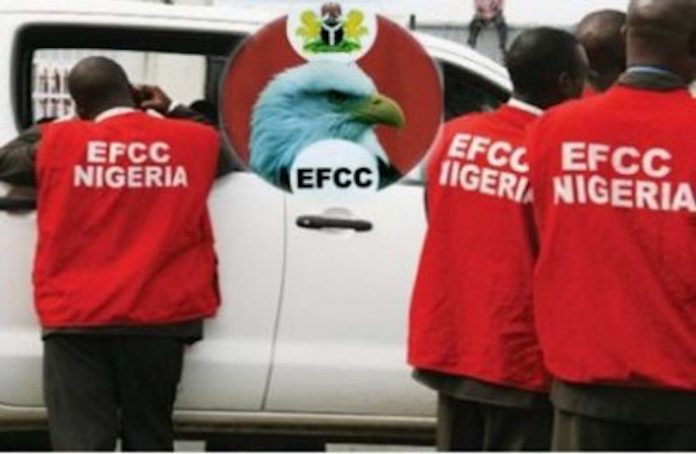
A Federal High Court, Abuja, on Thursday, set aside its order directing the Economic and Financial Crimes Commission (EFCC) to arrest Deputy Speaker of Imo, Amarachi Iwuanyawu, over his alleged complicity in alleged N785 million fraud.
Justice Inyang Ekwo, in a ruling, held that the EFCC deliberately suppressed and concealed facts about the matter in order to surreptitiously obtained the Nov. 25, 2022 order for arrest warrant against Iwuanyawu.
Justice Ekwo said he found that the anti-graft agency failed to disclose in its affidavit in support of the motion ex-parte filed to obtain the order that there was a pending suit at FCT High Court between Iwuanyawu and the person who petitioned the commission.
“The facts in the ex-parte motion are the same with the facts in the suit number: CV/356/2021 between Hakiz Investment Ltd V. Sun Gold Estate Ltd and two others now pending before the High Court of FCT in Exhibits B and C,” he said.
According to the judge, it Is also pertinent to state that good faith Is foundational in every application brought for any order ex parte.
“Going by the facts of this case, it has not been brought in good faith.
“The evidence before me shows that the applicant/respondent (EFCC) was being teleguided by the writer of the petition upon which the applicant/respondent purports to be acting on,” he said.
Justice Ekwo, who held that the commission had no business getting enmeshed in such matter, said the entire proceeding leading to the ex-parte order ought to be struck out.
He said EFCC should not allow itself to be used to interfere with judicial integrity.The judge, who said that the Imo deputy speaker had beend able to establish that there was non-disclosure of material facts in the application, said “the order is liable to be set aside on this ground. “
He consequently made an order discharging and vacating the ex-parte order of warrant of arrest issued for the arrest of Iwuanyawu by EFCC, Nigeria police, Department of State Security Services (DSS), the Nigerian Immigration Services and the Interpol.
He also made an order restraining the EFCC) from arresting or detaining him in respect of a purely civil, commercial and contractual matter pending before another court of coordinate jurisdiction.
The News Agency of Nigeria (NAN) reports that Iwuanyawu is the Chairman of an Abuja-based firm, Sun Gold Estate Limited.
The court had ordered Iwuanyawu’s arrest following an ex-parte request by the EFCC for a warrant arrest against him.
The judge ordered the EFCC to apprehended Mr Iwuanyawu and detain him till 23 February 2023, when he is expected to be brought to the court.
In the ex-parte application argued by Olarewaju Adeola, EFCC’s lawyer, Iwuanyawu, an estate developer, was alleged to have in 2012 entered into an agreement with another Abuja Company, Hokiz Investment Limited.
In the agreement, Iwuanyawu’s company agreed to build 14 units of four-bedroom terrace and one block of six flats on the land of Hokiz Investment Limited at Mabushi in Abuja.
According to court documents, the two parties agreed that 40 per cent of the buildings would be allocated to Hokiz Investment Limited being the owner of the land, while Sun Gold Estate as developer would retain 60 per cent.
But, upon completion, Sun Gold Estate Limited was said to have sold off all the buildings without the knowledge of the land owner.
The value of the 40 per cent of the buildings put at N785 million was said to have been made away with by Iwuanyawu.
Adeola had informed the court that a petition signed by Abdullahi Malik, SAN, on behalf of Hokiz Investment Limited was being investigated.
The anti-graft agency lamented that all efforts to make Iwuanyawu honour its invitations concerning the allegations were futile.
It said Mr Iwuanyawu had escaped to the United States.
The EFCC had based its request on Section 17 of the Advance Fee Fraud, Section 35 of the 1999 Constitution and Sections 3, 37, 39 of the Administration of Criminal Justice Act 2015.
(NAN)




















